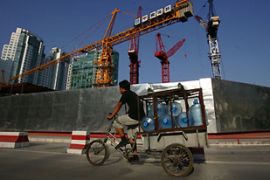China’s economy surges on
Highest growth rate in 11 years, but officials say structural problems remain.

Published On 25 Jan 2007
| Booming China |
|
GDP: up 10.7 per cent in 2006 Total economic output: $2.7 trn Investment in real estate: up 21.8 per cent Trade surplus: up 75 per cent to $177.5 bn Incomes (urban): up 10.4 per cent Incomes (rural): up 7.4 per cent Industrial output: up 12.5 per cent Retail sales: up 13.7 per cent Inflation: up 1.5 per cent |
In 2006, Xie said, investment in real estate and other assets surged, while consumer spending grew far more slowly.
According to the bureau’s statistics fixed asset investment rose 24 per cent for 2006, while retail sales, a main gauge of consumer spending and sentiment, increased 13.7 per cent.
Restrictions
The data suggests government efforts to cool off an investment boom and reduce China’s reliance on exports by boosting domestic consumption still have a long way to go.
Worried that runaway spending could spark inflation or a debt crisis, the central government has raised interest rates twice since April, repeatedly tightened bank credit and imposed restrictions on investment in real estate, vehicle factories and other projects.
It has also cracked down on wasteful investments, naming and shaming local officials it says have failed to comply with orders to tighten up planning procedures and observe tougher environmental protection criteria.
Unveiling the 2006 data at a press conference in Beijing, Xie emphasised that while there were risks he did not believe the economy was yet in a state of overheating.
‘Fast development’
Looking ahead he said he expected the economy to continue “steady and comparatively fast development” in 2007.
Nonetheless, Xie said, government efforts to boost consumer spending were “still not seeing significant results”.
“We’re finding it hard to meet the target of changing our economic structure.”
Other problems, he said, included a growing imbalance of payments and excess liquidity in the banking system.
China’s global trade surplus – the measure of money going into the country minus money going out, jumped by a record 74 per cent in 2006 to $177.5 bn.
If China’s economy continues to keep growing at the same pace it could leapfrog Germany by 2008, becoming the world’s third largest economy after the US and Japan.
Source: News Agencies